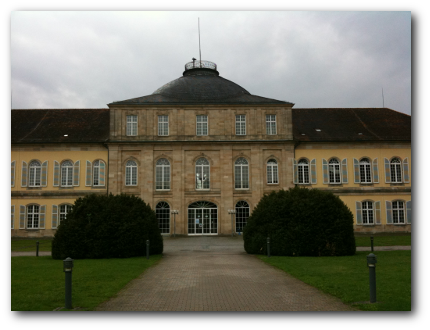I’ve just got back from a few days in Hohenheim, at the multi.player conference, and wanted to share my experiences. The conference was on “The social aspects of digital gaming”, and was a fantastic chance to meet people working in a similar field to myself.
The talk Pejman and I gave, on measuring social interaction in collocated gaming sessions, seemed to be really well received, and has received some insightful comments. I was a bit worried before about presenting an application of the Bartle Test to the man himself, however he didn’t seem to complain (much…). The research gave a better insight into how different player types react in collocated sessions, and hence was distinct from the other presentations – we also had a strong link to industry!

The University of Hohenheim
We were lucky to be featured alongside some other excellent presenters discussing interaction in collocated gaming, including Judith Ackermann (University of Bonn) and Johannes Breuer (University of Hohenheim). Judith presented “Anything but speechless – Face-to-face-communication during co-located gaming”, and had coded the verbal interactions from a number of LAN parties. Her findings, about the forms of interactions noted, seemed to correlate well with our own categories, which is encouraging. Judith is also starting to look into applying a similar methodology to collocated console gaming, which will be interesting to watch.
Johannes’ talk on Social interaction during co-located gaming sessions shared insight gained from measuring interaction, in their new Game Lab, and had particularly interesting insight into when different forms of interaction were present. We also had an opportunity to see their new game lab after the conference, and it looks like they have the potential to do lot’s of exciting research.
Other talks of note including Richard Bartle (slides are available here) who shared his insight into how his theory of player types should (and more importantly shouldn’t!) be applied. The topic proved extremely relevant for our research, and will be continually useful for understanding how to categorise player’s in future research.
Yvonne De Kort presented her research on “How to win friends – gaming as a socially situated experience”, where they had manipulated variables, such as sharing audio or line of sight, to understand what aspects of a social gaming session increased the player experience. Of particular interest (although not covered in the presentation) was the method used to define and measure player experience, since this is a potentially controversial topic!
I was also really impressed with the presentation by Jörg Müller-Lietzkow on “Why markets for Social Gaming (and browser games) are nearly unpredictable”. Having taken a slightly more business-relevant approach than other presentations, Jörg explained why the market for investing in facebook games has peaked, and venture capitalists will be looking at mobile games next. His talk seemed very up to date and relevant to current trends, which was particularly useful.
Throughout there was a really high quality of presentations, although the prevalence of WoW researchers and players was a bit surprising. I’ve never seen so many pictures of Orcs! I had expected, given current trends in commercial development, to see more about Zynga, free to play and micro-transactions, however this may be evidence of a disconnect between academia and current trends. I imagine if they ran a second conference next year, we might see more of this!

and more of this
Last of the all, I wanted to say thanks to all the organisers of the conference, it was a fantastic experience, especially all the social events! It was a fantastic opportunity to understand how my research fits into academia, and gave me lots of avenues to explore with future work. I’d be extremely interested in the opportunity to present there again.
Leave a Reply